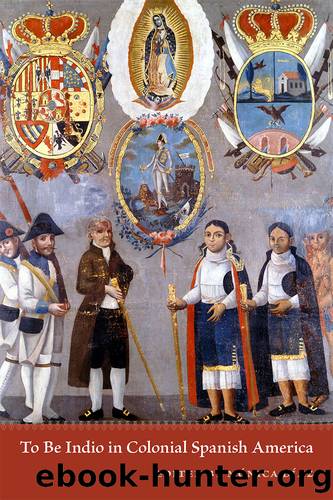To Be Indio in Colonial Spanish America by Mónica Díaz

Author:Mónica Díaz [Díaz, Mónica]
Language: eng
Format: epub
ISBN: 9780826357731
Barnesnoble:
Publisher: University of New Mexico Press
Published: 2017-06-15T00:00:00+00:00
CONCLUSION
The stories of these four men testify to the malleability of individual and collective indigenous identity in colonial Mexico. Personal desire trumped collective responsibility and membership in an indigenous community. Joseph/Juan Feliciano de la Cruz and Nicolás Sosa/Ubaldo, aka Carlos Arteaga, changed their names and adapted new personas because they chose to pursue their passions. They left their first wives and became different men to marry other women. Lorenzo Theodoro, by contrast, chose to return to his native community in the Philippines. For him the second marriage was a way of reinforcing his collective identity as an indigenous Filipino. If we believe him, Lorenzo did not pursue adventure but rather decided to resettle in his birthplace upon hearing that his first wife was dead. AgustÃn Miguel de Estrada, on the other hand, lacked any sense of accountability. He invented different individual and collective identities to serve his own purposes. His claim to being an Indian from the Philippines was ingenious. He must have thought that no one would ever find out that he had actually been born in Mexico and that his mother had African ancestry. Whatever their choices, the experiences of these four men represent the limitations of self reinvention and the reach of collective identity. They were found out because colonial society expected men to embrace their collective obligation to marry, raise a family, and be upstanding members of their Republic.
Natives of the Philippines who immigrated to Mexico mixed with the indigenous population, married Indian women, and interacted with colonial institutions as Indians. Emphasizing their common legal status as native vassals, they bridged cultural differences in order to live in a community as part of the Republic of Indians. For some individuals, however, it proved difficult to settle down in any one place or with only one woman. They abandoned their wives and remarried, which made them a threat to the social order. Indios chinos who committed bigamy prioritized their individual desires over their responsibilities as members of the Indian collective. It was not without consequence. Church and government officials tracked them down. And they were able to do so because colonial society kept a short check on nonnormative behavior.
Download
This site does not store any files on its server. We only index and link to content provided by other sites. Please contact the content providers to delete copyright contents if any and email us, we'll remove relevant links or contents immediately.
| Africa | Americas |
| Arctic & Antarctica | Asia |
| Australia & Oceania | Europe |
| Middle East | Russia |
| United States | World |
| Ancient Civilizations | Military |
| Historical Study & Educational Resources |
Machine Learning at Scale with H2O by Gregory Keys | David Whiting(4292)
Never by Ken Follett(3935)
Fairy Tale by Stephen King(3368)
Oathbringer (The Stormlight Archive, Book 3) by Brandon Sanderson(3147)
The Man Who Died Twice by Richard Osman(3070)
Will by Will Smith(2906)
Rationality by Steven Pinker(2350)
Can't Hurt Me: Master Your Mind and Defy the Odds - Clean Edition by David Goggins(2320)
The Dark Hours by Michael Connelly(2300)
Friends, Lovers, and the Big Terrible Thing by Matthew Perry(2219)
The Dawn of Everything: A New History of Humanity by David Graeber & David Wengrow(2187)
Principles for Dealing With the Changing World Order: Why Nations Succeed and Fail by Ray Dalio(2035)
A Short History of War by Jeremy Black(1842)
HBR's 10 Must Reads 2022 by Harvard Business Review(1838)
Go Tell the Bees That I Am Gone by Diana Gabaldon(1748)
A Game of Thrones (The Illustrated Edition) by George R. R. Martin(1711)
Kingdom of Ash by Maas Sarah J(1667)
515945210 by Unknown(1660)
443319537 by Unknown(1543)
